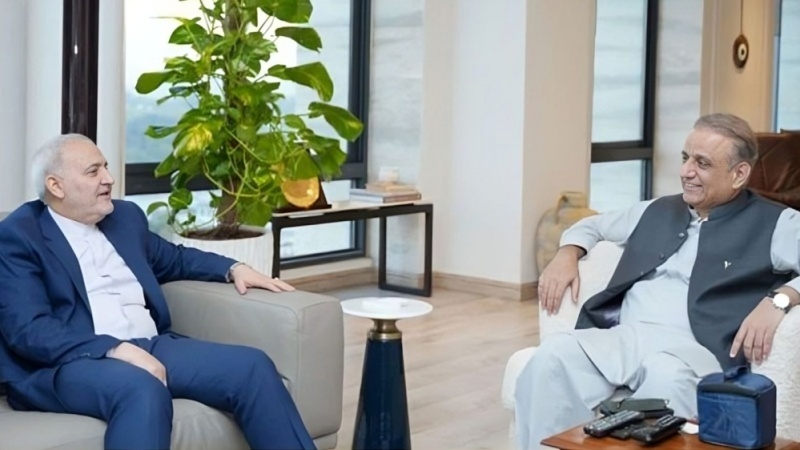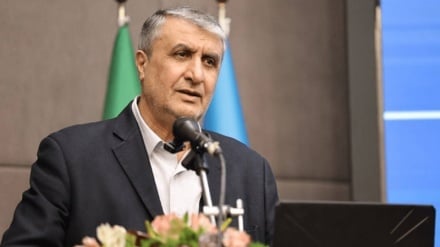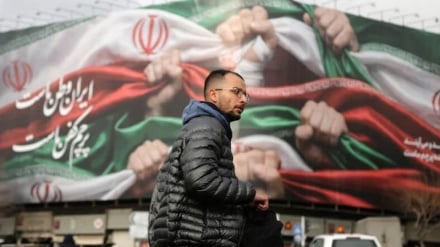Iran and Pakistan agree to expand bilateral relations
-

Right: Abdul Aleem Khan, Pakistan’s Minister of Communications, Left: Reza Amiri-Moqaddam, Iran’s Ambassador to Islamabad
Pars Today – The Pakistani Minister of Communications, during a meeting with the Iranian ambassador, stated that his country will facilitate the process of exports and imports between the two nations in order to accelerate trade agreements.
According to Pars Today, Abdul Aleem Khan, Pakistan’s Minister of Communications, stated on October 31, during a meeting with Reza Amiri-Moqaddam, Iran’s ambassador in Islamabad, that Pakistan is committed to facilitating the export and import process between Islamabad and Tehran to accelerate the implementation of bilateral trade agreements. He added that, in order to execute the agreements and speed up progress, a joint meeting will be held between Pakistan’s Ministry of Communications and the Iranian Embassy.
Abdul Aleem Khan, emphasizing the need to take fundamental steps to strengthen trade and communications between the two neighboring countries, stated: “Over the past six months, we have witnessed an enhancement of cooperation between the two nations.” He expressed hope that bilateral trade could reach $10 billion and added that all necessary measures will be taken to resolve issues related to the entry and exit of Iranian commercial trucks at border crossings.
The Iranian ambassador also emphasized during the meeting: “The level of relations between the two countries is now at its highest point in the past four decades. Additionally, a series of high-level meetings and follow-up sessions are planned in the coming weeks.”
Recently, following a meeting between the Pakistani Minister of Commerce and Iran’s Minister of Industry, Mine, and Trade, the two countries agreed to increase bilateral trade to $10 billion by developing transport infrastructure—an initiative that demonstrates their shared commitment to expanding economic cooperation.
Earlier, Ali Larijani, Secretary of Iran’s Supreme National Security Council, during a meeting with Seyed Mohsen Naqvi, Pakistan’s Interior Minister, on October 28, emphasized the importance of Iran and Pakistan’s geopolitical position in regional dynamics, stating: “Relations between Tehran and Islamabad have the potential to go beyond current cooperation and advance to a sustainable strategic partnership.”
The Pakistani Interior Minister, highlighting the deep-rooted historical, cultural, and security ties between the two nations, said: “Iran is a friend, brother, and partner for Pakistan. Islamabad desires a strong, stable, and leading Iran.”
The reasons for expanding Iran–Pakistan relations can be examined from geopolitical, economic, cultural, and security perspectives. The most important factors influencing the deepening of these relations include:
Proximity and shared border
Iran and Pakistan share a land border over 900 kilometers long, which plays an important role in border, trade, and security interactions. This geographical proximity provides a foundation for regional cooperation and facilitates both people-to-people and economic connections.
Shared interests in regional security
Both countries face similar security challenges such as drug trafficking, terrorism, and extremism. Security cooperation for border control, combating extremist groups, and strengthening regional stability is one of the key reasons behind the closeness of the two nations.
Energy exchange and trade
Iran, with its vast energy resources, and Pakistan, with its growing fuel demand, complement each other. Projects such as the Iran–Pakistan gas pipeline and electricity exports from Iran to Pakistan’s border regions are examples of economic cooperation in the energy sector.
Cultural and religious interactions
The existence of religious and cultural ties between the nations of the two countries provides a foundation for people-to-people engagement and cultural closeness. Joint religious ceremonies, particularly the Arbaeen pilgrimage, as well as exchanges of students and elites, have also contributed to strengthening these connections.
Regional developments and the need for convergence
Amid multiple crises in West and South Asia, Iran and Pakistan seek to strengthen convergence to address shared threats and take advantage of regional opportunities. Recent diplomatic visits and bilateral agreements reflect the political will to expand their relations.
Efforts to reduce dependence on the West
Both countries are striving to reduce their dependence on the West and, by strengthening regional relations, to find new pathways for economic and political development. This policy has led to increased bilateral and multilateral interactions between Iran and Pakistan.


